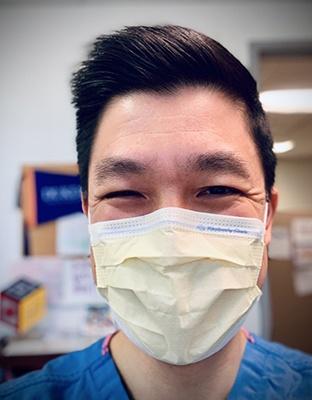
Adolescent Medicine Specialist Richard J. Chung, MD is one of the healthcare providers committed to caring for our community throughout the COVID-19 pandemic. Here's what he still finds beautiful despite the challenge.
In this challenging time for our community, where have you seen beauty?
Working in the health system, I have been struck by the obvious yet profound realization that everyone is “merely” human. Whether a nursing assistant, an oncologist, a respiratory therapist, or a surgeon, I have seen the pandemic bring to full relief the common humanity among all of us. And that humanity, in this particular moment, is distinctly vulnerable. Why? Because we are also parents, partners, siblings, children, and grandparents. We are vulnerable individuals with vulnerable families living in vulnerable communities. And that makes this crisis all-consuming and treacherous.
However, layered onto that fragile humanity is the calling – to care for our neighbors. And that is where beauty emerges. If everyone showed up to work in the ERs and the ICUs fearless and invulnerable, that would be truly impressive but not particularly beautiful. Beauty lies in the genuine vulnerability of each individual, who nevertheless shows up. Because of the calling. Because of those being served. Therein lies the sacrifice, which has always been there, of course, but is particularly breathtaking in this terrible moment. Each person has their own catalyst that draws it all together – I suspect the common pathway for all of us is some combination of faith, hope, and love – but regardless, the end result is a beautiful community of helpers, each doing their part.
I have also seen beauty in my neighborhood. If we adopt the wartime verbiage that has been so popular in describing the pandemic, I have seen my neighbors on their own frontlines in this war. While the major and most obvious battle is being waged in hospitals and clinics, other battles and skirmishes are scattered throughout our community. This pandemic’s first effects are clinical but its cascade of consequences is varied and complex. Whether it is helping children who are yearning to learn, supporting storekeepers thrust into uncertainty, or courageously confronting racism, I have seen my neighbors respond in beautiful ways. And it isn’t because of some simplistic and easy crisis-time altruism. The fact is, it isn’t easy. It isn’t automatic. It is despite weakness, being strong. Despite fear, being brave. Despite scarcity, being generous. And despite looming darkness, finding hope.
This article originally appeared on the Discover Durham website.